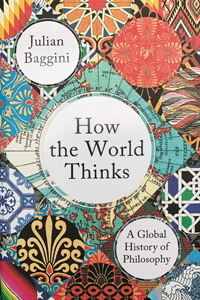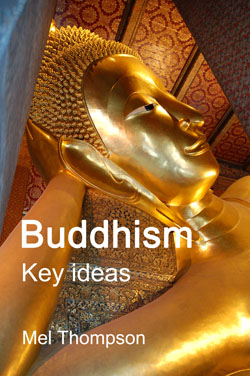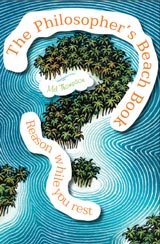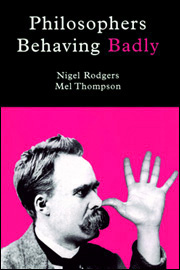 How the World Thinks – Julian Baggini
How the World Thinks – Julian Baggini
In this important and timely book, Baggini breaks out of the usual confines of Western Philosophy to show how thinkers from India, the Far East and elsewhere grapple with universal questions in the light of their own cultural backgrounds.
Don’t be fooled by the subtitle; this is not, as the cover proclaims, ‘A Global History of Philosophy’, it is far more significant and valuable than that.
It is a serious attempt, by a philosopher nurtured within the Anglophone world of Western Philosophy, to explore the insights to be found in philosophies produced in the Islamic world, India and the Far East, with more modest excursions into African thought, Russia and an interesting exploration of the influence of pragmatism in the United States.
Eastern thought has generally been explored through the perspectives of cultural or religious studies – after all, most would say, should Confucianism, Taoism and Buddhism not be considered religions? But the result of this is that Western philosophy in the English-speaking world has tended to consider itself a unique and universal repository of rational exploration, heir to the ancient Greek thinkers, and spared the more eccentric and socially engaged philosophers from the ‘Continental’ tradition and the religious and mystical influences of the East. It has often gone for precision of thought rather than breadth of vision. It has assumed that reason alone shapes and justifies arguments, and that social and cultural factors should generally be bracketed out.
But what Baggini finds in the course of this book is that philosophy in other cultures – particularly in the Far East – raises serious questions about how the world is, who we are as individuals, and how we should organise our lives, in a way that runs parallel to issues debated within the Western philosophical canon. He shows that, far from being a distraction, the particulars of each culture and religion both inform and are informed by its underlying philosophy.
Here the title is absolutely right, and not at all in line with the sub-title. It is about ‘How’ the world thinks, not ‘What’ it thinks. Too often, books produced by Western thinkers have taken conclusions reached in other cultures, examined them in Western terms, compared and contrasted them, and made superficial judgements, without any attempt to explore the culture that has produced them or the society that sustains them. That’s the ‘What’ of many huge and detailed studies, and it is only of value once the context and motivation for that thought – the ‘How’ of such thinking – has been appreciated.
Baggini’s style is always readable, and this is aided by the way in which he builds up his argument through comments taken from interviews with many different people – a technique he used to particularly good effect in his earlier book The Ego Trick. There is a danger in taking this approach, of course. It is possible, by focusing on immediate comments, to bracket out the background and circumstances in which the explanation has been given, not least that the person is trying to explain his or her ideas to a Western philosopher. From time to time, one senses that Baggini’s own prejudices show but, by and large, he manages to avoid this, presenting ideas very much within their own context and reflecting their cultural values. This is particularly the case with Far Eastern philosophy, where naturalness and harmony are seen as basic qualities to be cultivated. You always sense that Baggini strives to understand and allow those he meets to express their thoughts in their own way.
There are superb sections illustrating the aesthetic and existential qualities of Japanese thought, with a focus on the immediately present experience, and the ideal that one might need to let go of effort in order to understand. This is so utterly different from the Western philosophical tendency to analyse and investigate in utmost detail, even at the expense of an overall sense of meaning.
In particular Baggini shows that, in the Far East, philosophy is far more about engaging with reality than attempting to achieve an ‘objective’ analysis. There is much here for the overlap of philosophy and the arts – exploring how it is that in Chinese art, human beings are placed small within the landscape, artistic style reflecting an underlying philosophy.
Sometimes his conclusions absolutely demand further reflection, as when he concludes that ‘The value of metaphysics is existential, not scientific. That is why it is possible to learn from more than one metaphysical system, because the way we structure experience is in part due to the innate structure of our minds and in part because of the way in which our minds and societies structure each other’ (p169). That could provide the starting point of a whole philosophical journey.
There is a valuable chapter on ethics, including an exploration of the way in which virtue may be cultivated through habit in both Confucius and Aristotle, contrasting the social aspects of Ethics in Eastern thought with the more Western tendency to focus on individual rights and responsibilities.
At one point, in suggesting that there is no sharp distinction between emotions and cognition, with each flowing into the other, he uses the term ‘reflective sensitivity’ – an expression I would never have expected to hear from a philosopher trained in the Anglophone world of Western philosophy – an expression that could well describe Baggini’s overall approach. The book is exactly that: a reflective and attentive approach to understanding how the world thinks.
When, at the end of the book, he comes to introduce his suggestions for ‘Further Reading’ he says:
‘There are so many intellectual journeys that could start from this book.’
With that I wholeheartedly agree, and for that reason alone it should be required reading for all who might be tempted by the idea that philosophy can be defined narrowly in terms of precision of argument and the hygienic clarification of language.




